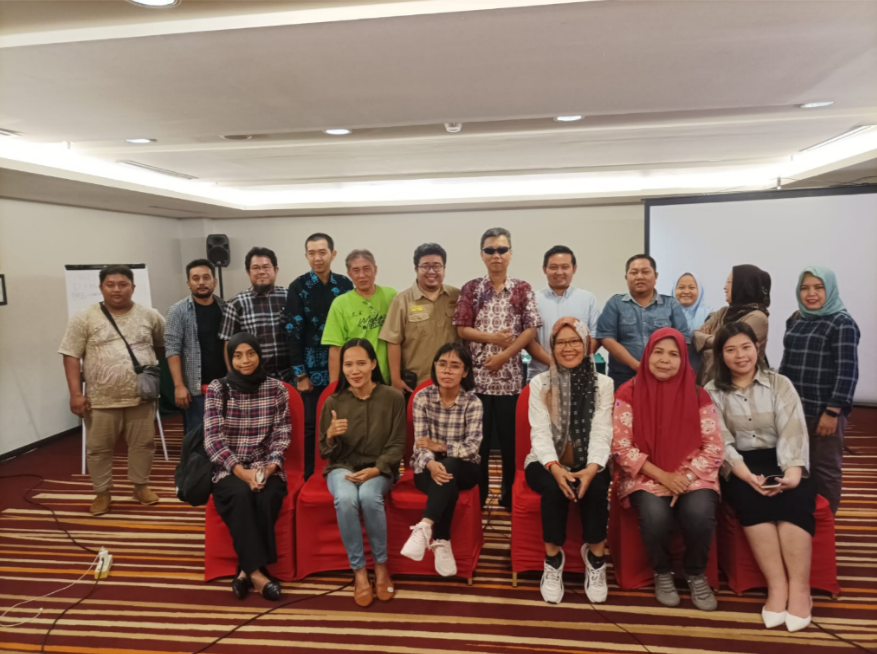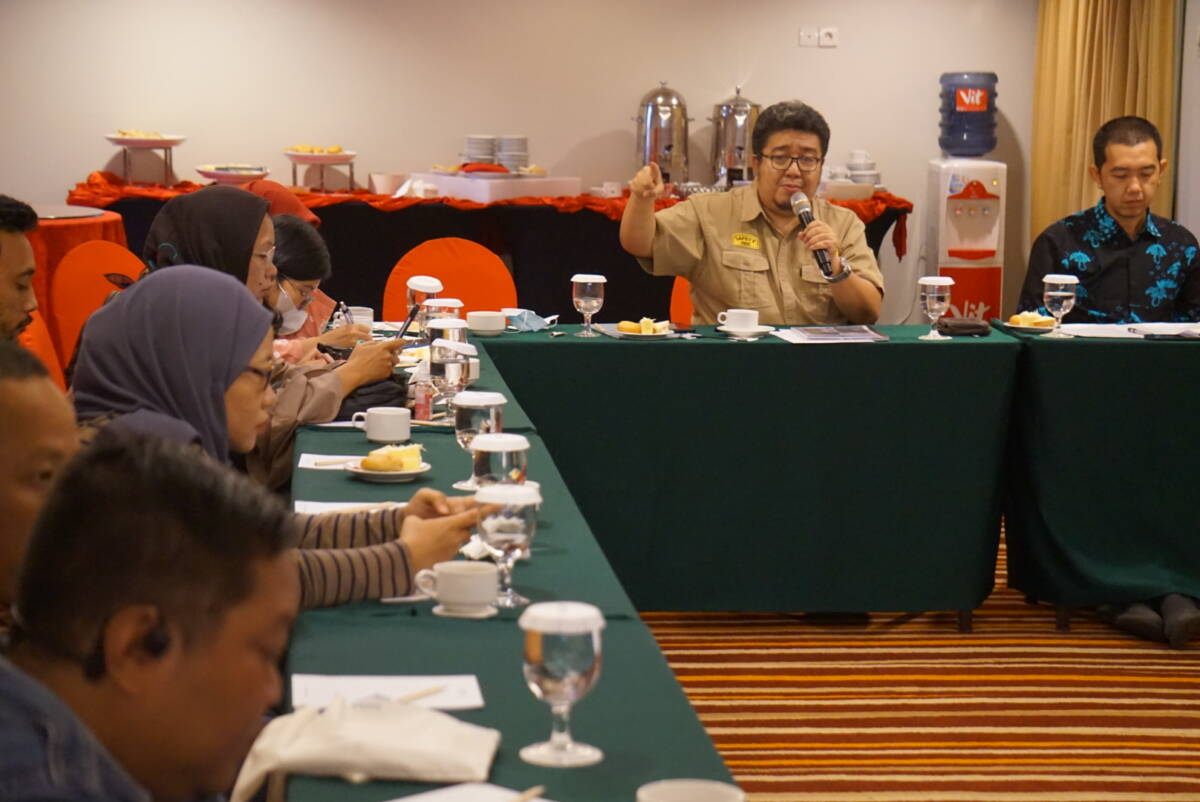
Indonesia and other countries signed the Paris Agreement in 2015 in an effort to reduce greenhouse gas emissions and protect our Earth. This agreement has established a strong foundation for fighting climate change, with one of the main focuses being the energy transition, which refers to the transition from using fossil energy, which is limited and damages the environment, to renewable energy which is clean and environmentally friendly. Indonesia has a big responsibility to lead this change. In facing global climate change, energy transition is the key to ensuring the sustainability of Indonesia’s natural resources and economy.
In connection with this, the Institute for Essential Services Reform (IESR) held a Media Briefing event entitled “Energy Transition and IESR Study in Muara Enim Regency” on September 26, 2023. The Media Briefing event was attended by 18 journalists from various printed and online media in South Sumatra. IESR gave a presentation on the results of a study in Muara Enim Regency to provide a comprehensive picture of the impact of the energy transition in social and economic sectors.
Representative of the IESR Sustainable Energy Access program, Reananda Permono, explained that the Media Briefing activity was held to increase the insight of journalists in South Sumatra regarding the energy transition issue. Apart from that, IESR wants to bring journalists closer to competent sources regarding renewable energy issues by presenting four panelists from various backgrounds, namely the provincial government (ESDM Sumsel), district government (Bappeda Muara Enim), academics (Unsri), and CSO (HaKI).
“The energy transition cannot happen alone, but also needs to involve the active participation of society and various parties, such as journalists. By conveying accurate information, voicing diverse perspectives, and maintaining accountability, they help shape society’s views on energy and provide the necessary encouragement for stakeholders to move towards a cleaner and more sustainable future,” explained Reananda.
Social and Economic Analyst from IESR, Martha Jessica Mendrofa, explained that the global energy transition carried out by countries that import coal from Indonesia, such as China, India and Vietnam, will have an impact on the national economy since more than 70% of Indonesian coal production is exported. The economy of South Sumatra, with the second highest coal reserves in Indonesia at 9,345.57 million tons, will also be affected considering that the coal and lignite mining sector contributes 15.78% of the province’s GRDP in 2022. In this regard, IESR has conducted a study of the impact of the energy transition and economy in Muara Enim during 2021-2023. Muara Enim was the target of the study because it has become the top two coal producers in South Sumatra in the last five years, with production of more than 20 million tons per year.
“Based on IESR analysis, the mining sector in Muara Enim Regency does not have the highest multiplier impact in terms of income and employment, whereas the service, trade and agriculture sectors still have a higher impact on the economy. “Apart from that, the coal industry does not provide high added value to labor wages because companies capture a larger portion of income, the ratio is around 20% versus 78%,” he explained.
Head of the Energy Division of the South Sumatra Energy and Mineral Resources (ESDM) Department Dr. Aryansyah explained that the world energy transition trend would have an impact on domestic conditions. For this reason, his party has done several things to perpetuate the energy transition, such as issuing a special regional regulation for the development of the renewable energy sector, a gubernatorial regulation on electric-based vehicles, and a study of renewable energy in all districts/cities of South Sumatra.
“Currently, South Sumatra is an energy reservoir. We have an electricity surplus of 1,000 MW and that electricity is exported to other provinces such as Jambi and Bengkulu. There must be a generating source to replace that. We are ready for the energy transition. “For example, we have a mini hydro power plant for Pagar Alam’s electricity supply,” explained Aryansyah.
Representative of the Muara Enim Regency Bappeda, Fajrin Ulinnuha, said that his party had prepared the Muara Enim Industrial Area (KITE), to face the reduction in coal production in the future, the development of which had reached 80% as of June 2023. This industrial area covers the CPO (crude palm oil) business. or palm oil) and the coal downstream industry. Muara Enim also has a PLTP (Geothermal Power Plant) owned by Supreme and Pertamina.
“We need to ensure the availability of access to clean energy for all groups, especially in the electrification sector because the majority of electricity sources come from coal. Sources of funding are also an important issue as the energy transition continues.
There are many new projects, so large funds are needed. “Regional governments also need research and technology support from other institutions, as well as training for reliable human resources to be ready to face the energy transition,” said Fajrin.
Sriwijaya University development economics lecturer Dr. Muhammad Subardin reminded that the goal of development is to reduce unemployment and poverty. So, it is necessary to ascertain whether an industrial sector can lift the economy of a region or not. Subardin introduced the term Dutch Disease, where areas with high natural wealth tend to have low economic levels. Through his own research, Subardin succeeded in proving this condition in South Sumatra by comparing the economic conditions in “mineral districts” and “non-mineral districts”.
“I identified eight mineral districts in South Sumatra, including Muara Enim. Almost the entire Muara Enim area is included in the coal concession area. Based on research I conducted, it is proven that the economic level of mineral districts is no better than non-mineral districts in South Sumatra. “This proves that the mining industry cannot improve the welfare of a region because this industry is capital intensive, not labor intensive,” explained Subardin.
Executive Director of the Kita Forest Association Institute (HaKI) Deddy Permana stated that apart from economic problems, knowledge and information gaps are important in energy transition activities. This is where journalists can play a role in disseminating information to the wider community.
“There is often a gap in information between local communities and the elite because people only know the conditions that occur on the ground. For example, companies actually understand this energy transition trend because some of them are already focused on developing businesses outside of coal. “Another problem is that sometimes CSR funds are not channeled to posts that can support energy transition activities,” explained Deddy.

